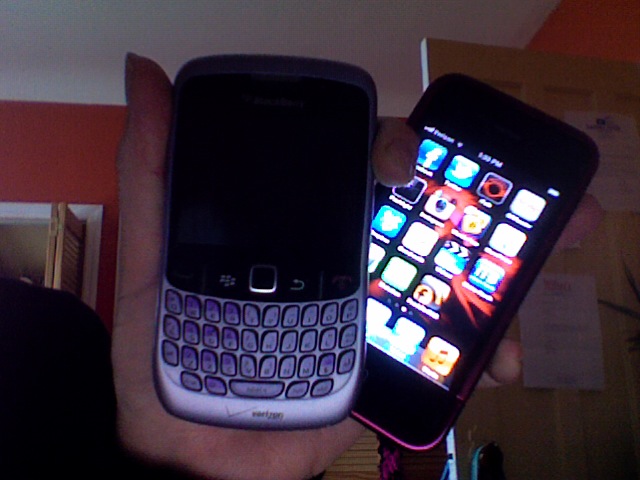In my book, I wrote a main character who is addicted to her iPhone. The character’s cell phone addiction was meant to be a commentary on all the people I saw hunched over their iPhone displays, gabbing about apps and texting their ways through life, rather than living it. I wrote the book before I actually had an iPhone, * but this may or may not have been hypocritical on my part anyhow, since at the time I rewrote Beware the Hawk, I possessed what my husband referred to as a Crackberry.
But I hardly used the browser. I didn’t play Blackberry games. I only communicated with one person (my editor, actually) over the messenger. Then my Blackberry died, and I got an iPhone.
All of a sudden, I understood. There were no tiny keys to wrestle with! The camera was not as good as the Blackberry camera, but I could have more fun with the photos! The touchscreen was so big that tweeting and Facebooking from my phone were a pleasure! I could play Words with Friends! I suddenly had GPS! Now I could see what all the Angry Birds fuss was about!
I know. That’s a lot of exclamation points, but I think that’s what the i in iPhone is. Turn it upside down and flip it around and what you get it is “Phone!” And that’s the iPhone. It’s not a phone. It’s a Phone! And it’s addictive.
Now I’m trying to break myself of the cycle of obsessively checking my phone, which is as rude as it is worthless. I’m pretty sure that having a smartphone is making me dumber. Here are some examples:
- Having email on my phone has actually made me worse at correspondence. (“Oh, I’ll just email that person back when I’m at my laptop.”)
- Having the calendar on it has made me worse at scheduling. (“Oh no, an event I’m supposed to be at is happening a state away in five minutes!”)
- I can’t remember phone numbers anymore because they’re all programmed into my phone. (“Sure, Officer, let me just grab my phone and look up my husband’s phone number for you.”)
So, I’m stepping away from the phone and, to some extent the Internet, this summer. I’m not “quitting Facebook” or giving up my phone or anything dramatic, but I am going to set some limits.
Right now, my iPhone is hidden under a pillow in another room so I won’t hear it buzzing. I have disabled all Push notifications for my social networks. I will not pick it up until I have written a required number of words. I am checking email only a few times a day. I’ve put all my appointments onto an actual desk calendar that I can see. Who knows? Later I may make myself write my husband’s phone number on a piece of paper 50 times the way my fourth grade teacher made me do with multiplication tables when I was being punished for something.
*In all honesty, I wrote the first drafts before iPhones were invented. The original phones were just regular 2001 phones. I was all kinds of excited to add iPhones last year and write the scenes as an indictment of iPhone users. I think this is called Karma.

